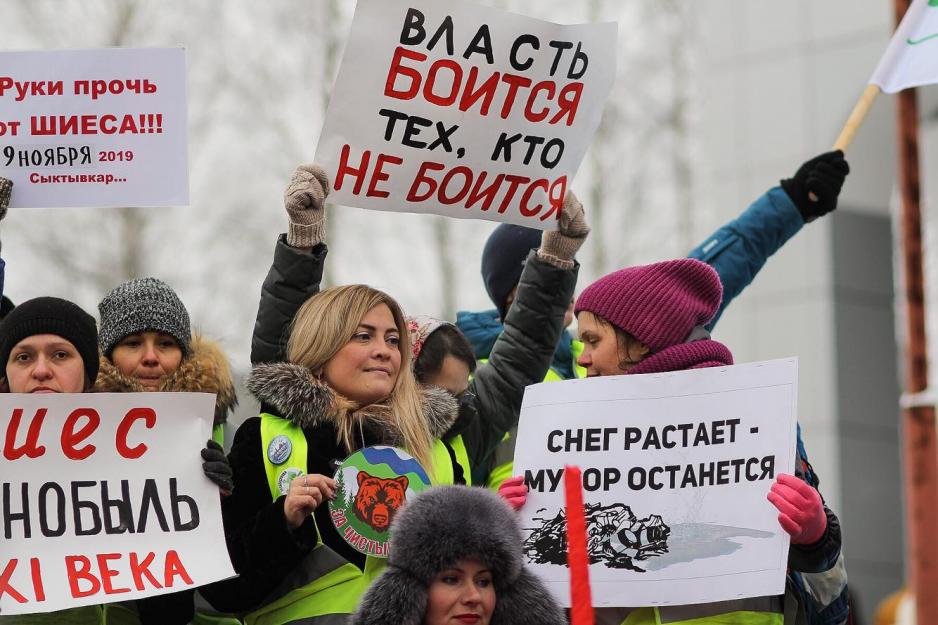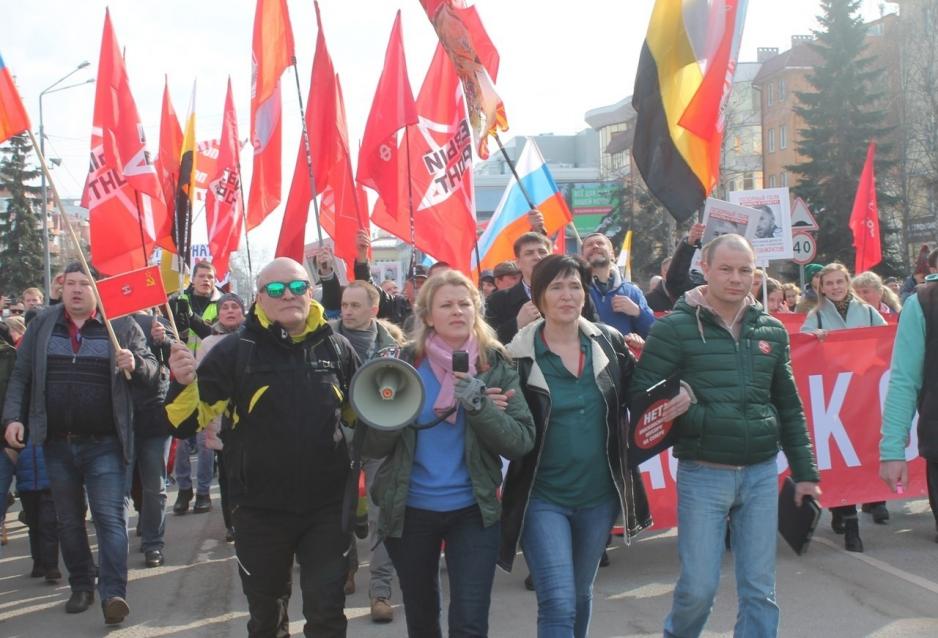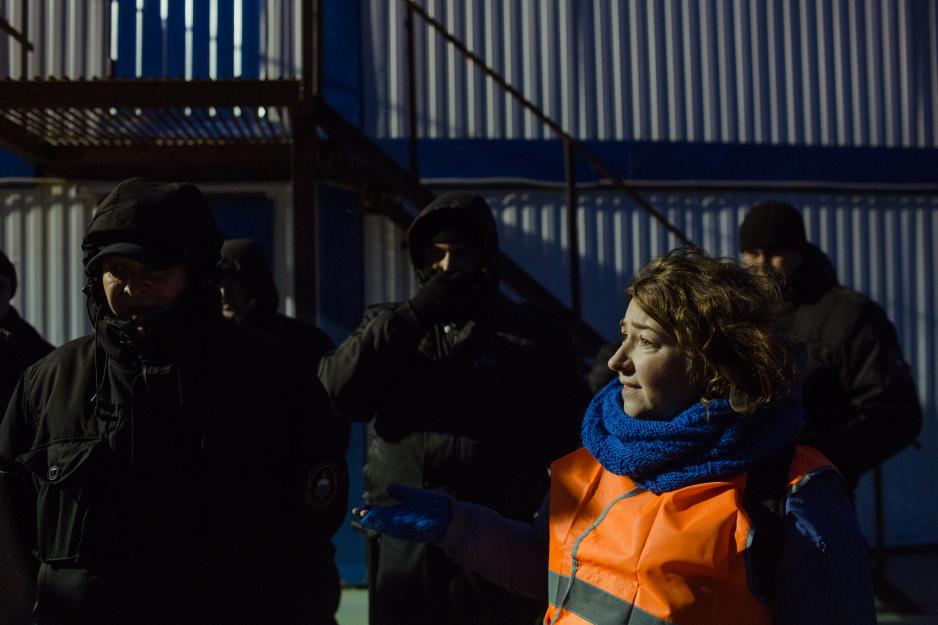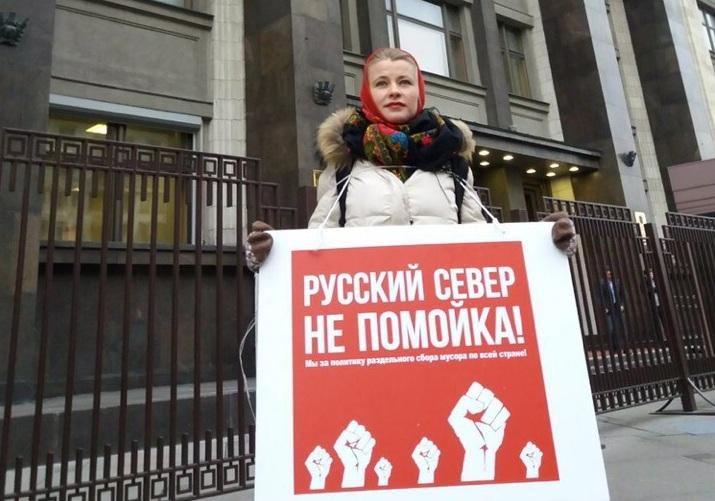Garbage Rage Grows in the Russian Arctic. Russian Supreme Court Processing Protest Appeal

Power fears those who have no fears, says this poster from last weekend’s garbage demonstration in Syktyvkar. Photo: Ivan Fedosejev
Youngsters of today see, analyze and understand the injustice in the country and act on it, says activist Antonia Obednina. Today, the Russian Supreme Court processes the demand about a public referendum on the construction of a garbage landfill in Arkhangelsk.
- We are optimists. If we were not, we would have lowered our hands and reconciled a long time ago, says Antonia Obednina (37).
For the past year, the 37-year old sales manager has spent all her free time fighting the planned garbage landfill at Shies in her home county Arkhangelsk.
Obednina is originally from Solombal, a part of Arkhangelsk, but now lives in Moscow. At the same time as the Russian Supreme Court is processing an appeal about whether or not there should be a public referendum on the construction of the contested garbage landfill at Shies train station, Obednina talks about why she has engaged in the fight against the landfill.
- I became an activist one year ago and since then, my life has changed 180 degrees. I organize activists, we unite activists. We have sent hundreds of letters to the government. We participate in the public debate about waste reforms. Young people today see, analyze and understand the injustice in this country and act on it, Obednina says to High North News.
The court system has deteriorated. For ever injustice, the number of dissidents increases rather fast.

Antonia Obednina (center, with megaphone) has been a key person of the protest movement in Russia during the past year. Here from a demonstration in April this year. Photo: Private
The Garbage Conflict in Northeastern Russia
A 5,000 acre waste landfill is planned near Shies railway station in the southern part of Arkhangelsk county.
Construction works commenced in the summer of 2018.
The landfill is to receive 500,000 tons of unsorted waste from the Moscow region ever year for a period of 20 years.
The plans have sparked major local protests. Since the end of February, local activist groups have physically blocked all roads in to the construction area in order to cut off supply lines for fuel to the construction machines.
Conflict deadlocked
Since the end of July 2018, protesters and environmentalists have blocked the construction of a 5,000 hectar garbage landfill deep inside the forests of the Russian Arctic.
On the border between Arkhangelsk and Komi counties, some 1,240 kilometers north of Moscow, Russian authorities want to build a landfill for unsorted waste from the Moscow region.
The plan is to transport 500,000 tons of waste here every year for 20 years.
The construction of the landfill has spared some of the largest social protests in Russia since the end of the Soviet Union. Today, nearly 18 months later, the conflict is more deadlocked than ever. Shies has become the gathering place for environmentalists and activists from all over Russia. however, Shies has also become synonymous with a growing dissatisfaction with several social challenges.
Obednina says activists and environmentalists use the Russian constitution’s section 42 in their fight, a paragraph covering violations of environmental legislation.
- The court system has deteriorated. For every injustice, the number of dissidents grows rather fast. Civilian society is growing. It is hard to stand alone in this, that is why we unite, Obednina says.

High North News visited Shies in March this year. Photo: Denis Sinjakov
New demonstrations
Russian authorities have tightened their grip around Shies lately. Last month, both a lawyer working to defend environmentalists as well as a journalist covering the protests closely were arrested by the Arkhangelsk police.
Last weekend, 5,000 people participated in a protest against Shies in the city of Syktyvkar in Komi county. In September, similar protests were organized in 30 cities all over Russia.
The main paroles in Saturday’s demonstrations were that the Komi police chief has to go, that President Putin and Prime Minister Medvedev have to resign, that the garbage reform has to be shelved and that the Shies plans should be stopped, and amnesty applied for all arrested activists, says Ilya Boloban, a Syktyvkar-based journalist who has been following the protests closely.
A larger social movement
The engagement has surprised Russians too. Shies has become the beginning of a larger social movement that currently is about far more than just resistance against the landfill in Northwestern Russia, says Kirill Koroteyev, lawyer at the Agora human rights organization.
- The engagement is impressive and the level we are seeing today would be unthinkable just a few years ago. This is not specifically about Shies, there have been several issues mobilizing society; elections, pensions reform, environment, police brutality and academic freedom.
- There is an increased understanding in society for these issues’ affecting individuals’ everyday life and dignity. The lack of institutions that take these into account makes the voices of these people heard now, Koroteyev says.
- When we talk about Shies; how may this conflict end?
- Event though the authorities continue wielding a clenched fist in Shies, it will not be able to continue this project without making amendments. Russian authorities will never admit caving to pressure, however, the project’s size or the technology used will perhaps be different – if this ever comes to fruition at all, says Koroteyev.
There is an increased understanding in society for these issues’ affecting individuals’ everyday life and dignity.

The conflict about the construction of a waste landfill in Shies grows. There have been several clashes between security guards and activists. Photo: Denis Sinjakov
Increases awareness in Russians
The most important thing is not whether you win or not. But through these court processes, where one tries to have one’s rights respected by the state using the law, increases awareness in a growing number of people about the fact that there is actually the possibility of appealing, says Inna Sangadzhieva, who is advisor at the Norwegian Helsinki Committee.
She is familiar with civil society in Russia.
- People do not give in despite high fines and retaliations enforced against the activists. People stand up for the cause because their understanding here is that they want to decide themselves about their nature areas. The demands have changed. It is no longer about a waste landfill or other specific issues. The appeals are more aimed against the authorities as such, about demonstrating that you are not happy with the state of affairs. And that is when you start talking politics, says Sangadzhieva.
- Contract with one’s consciousness
Antonia Obednina says the activist work is about establishing a civil society from the bottom up, one step after the next. She does not believe today’s ruling from the Russian Supreme Court will be in favor of the activists, however, argues that the judges nevertheless will “realise that they are making a contract with their consciousness”.
- Today, I heard from a guy who works in the military. He was dedicated to Putin all until injustice hit himself. Today, he told me that only a cleansing of guilt will save this country, says Obednina.

The Russian High Noth is not garbage, says the poster Antonia Obednina holds up outside the Russian parliament in Moscow. Photo: Private
This article was originally published in Norwegian and has been translated by HNN's Elisabeth Bergquist.

